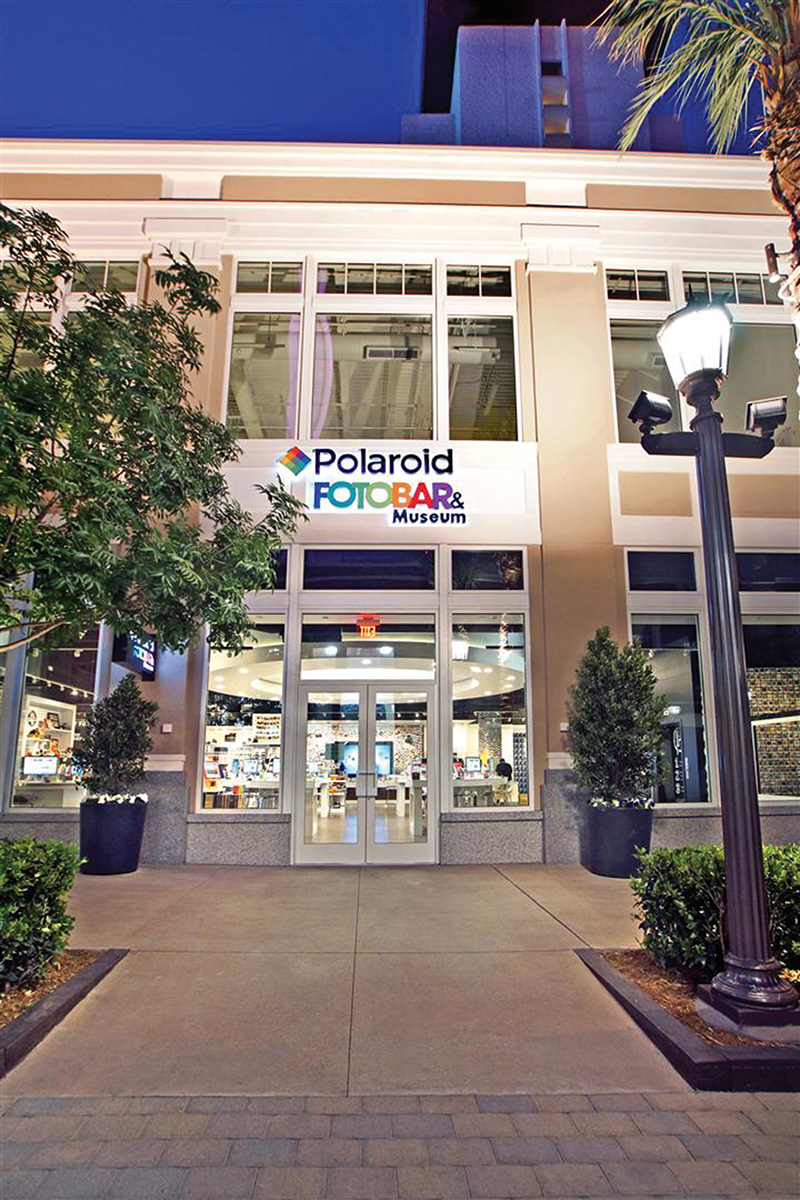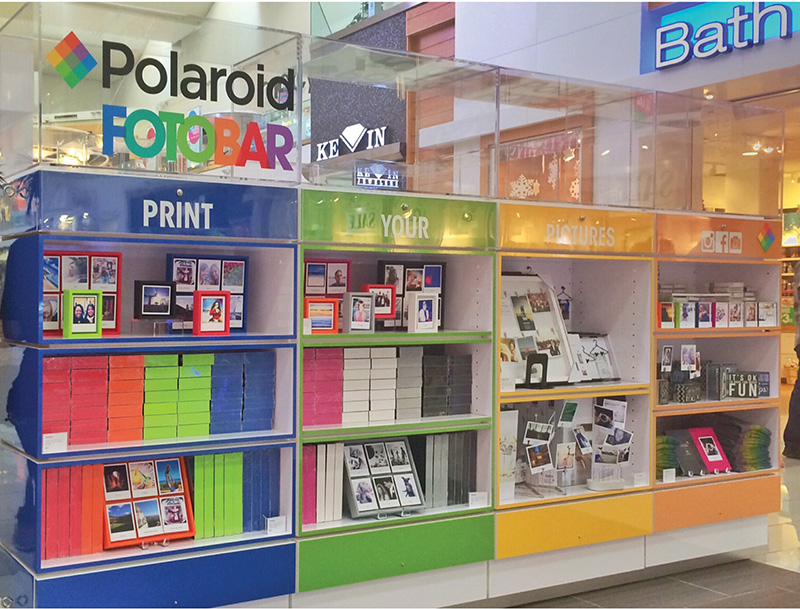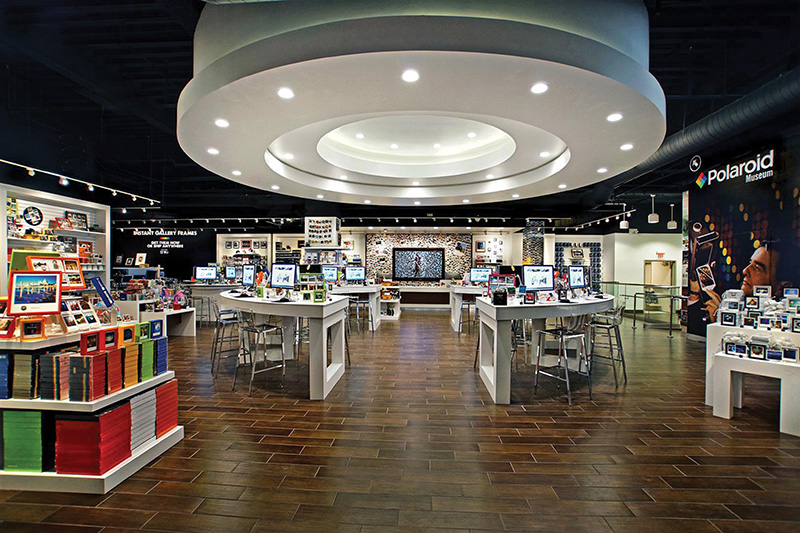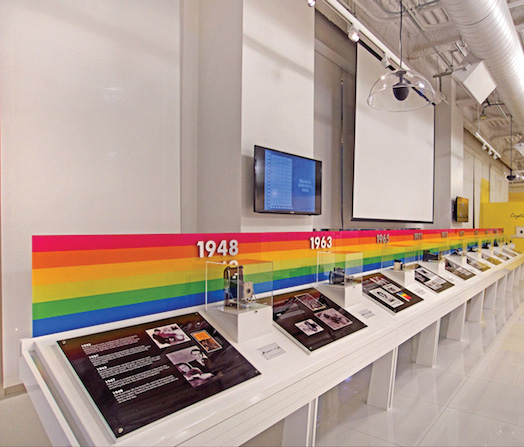With a new retail concept, Polaroid Fotobar aims to liberate those memories trapped on our phones.
Interview by Katie Lee
 If a picture really is worth 1,000 words, then all of us have many thousands of stories captured on our smartphones and social media pages. But there the vast majority of them remain: on our phones and online. Boca Raton, Florida-based Polaroid Fotobar recognized this issue and vowed to free those trapped photos we all carry around. Founded in 2012, Polaroid Fotobar is a first-of-its-kind, fun, experiential retail destination that is changing the paradigm of how people “liberate” their photos and turn them into innovative and memorable products. One thing is certain: Polaroid Fotobar understands that “we are all photographers” now — and now with three full-line stores and seven micro-retail stores currently open, the concept is just beginning to catch fire and grow. Retail Facility Business recently interviewed CEO Warren Struhl to learn more about Polaroid Fotobar’s plans for the future.
If a picture really is worth 1,000 words, then all of us have many thousands of stories captured on our smartphones and social media pages. But there the vast majority of them remain: on our phones and online. Boca Raton, Florida-based Polaroid Fotobar recognized this issue and vowed to free those trapped photos we all carry around. Founded in 2012, Polaroid Fotobar is a first-of-its-kind, fun, experiential retail destination that is changing the paradigm of how people “liberate” their photos and turn them into innovative and memorable products. One thing is certain: Polaroid Fotobar understands that “we are all photographers” now — and now with three full-line stores and seven micro-retail stores currently open, the concept is just beginning to catch fire and grow. Retail Facility Business recently interviewed CEO Warren Struhl to learn more about Polaroid Fotobar’s plans for the future.
RFB: How many stores does Polaroid Fotobar operate? How many new full-line stores are planned in 2015?
Warren Struhl: “We currently have three in-line stores: Delray Beach, Florida; Boca Raton, Florida; and our flagship in Las Vegas featuring the Polaroid Museum. By January, we will have opened seven additional micro-retail units across California. 2015 will feature more of the micro-retail units nationwide.”
RFB: Tell me about your “micro-expansion,” the new mini-stores that opened at the end of [2014].
Struhl: “We’ve received great feedback from our traditional brick-and-mortar locations, but we know that the new smaller, inviting store layouts are something consumers will respond to. The California locations in Westfield malls are high-traffic malls in great geographic areas. Westfield is putting a lot of emphasis on immersive retail experiences in their common areas, which fits perfectly with our micro-retail offering. Our plan is to continue opening up further locations in 2015.”
RFB: When did the first Polaroid Fotobar store open and how did the concept originate?
 Struhl: “Our first store opened right down the road from us in Delray Beach [Florida] in March 2013. It arose from an obvious need we observed, namely that people were taking more photos than they ever had before, but printing less. If we could give people an easy, simple and fun solution to print their best photos, we knew they would come in droves.”
Struhl: “Our first store opened right down the road from us in Delray Beach [Florida] in March 2013. It arose from an obvious need we observed, namely that people were taking more photos than they ever had before, but printing less. If we could give people an easy, simple and fun solution to print their best photos, we knew they would come in droves.”
RFB: Describe how your stores are designed. What sorts of architectural elements set them apart?
Struhl: “It was crucial to ensure that the design of the store was done in a way that supports the experiential component of our offering; otherwise, why go to the store? We have the actual ‘fotobar,’ where customers sit and interact with our platform to upload, edit and order their photo products — all with the help of ‘fototenders’ who interact and assist customers through the process. It was also important to make sure we surrounded people with great products at every step so they can see, feel and touch and ultimately be inspired to make something special.”
RFB: It must be challenging to connect with a new generation that keeps photos on their phones. How does Polaroid Fotobar make printing photos fun again?
Struhl: “It’s all about the process and about being inspired. We know that everyone is a photographer today. So why are people printing less? It’s certainly not for a lack of photos; more pictures were taken [in 2013] than all of history combined! What we’ve been able to create, though, is an easy and fun environment to print and be inspired to do something special with your best photos. The atmosphere we’ve created in our stores and our products is the antidote to all those trapped photos on people’s phones and social media pages.”
RFB: Are your stores primarily mall-based? Always in Westfield malls? What about lifestyle centers? Any freestanding locations?
 Struhl: “We are not exclusive to any one mall and in fact currently have locations with three different developers. Our go-forward prototype is the 300-square-foot micro-retail unit we began rolling out in California [in November]. It offers the most optimal solution — allowing us to maintain the same experience our customers have come to expect in a more efficient footprint.”
Struhl: “We are not exclusive to any one mall and in fact currently have locations with three different developers. Our go-forward prototype is the 300-square-foot micro-retail unit we began rolling out in California [in November]. It offers the most optimal solution — allowing us to maintain the same experience our customers have come to expect in a more efficient footprint.”
RFB: What do you enjoy most about your job on a daily basis?
Struhl: “People’s photos tell the story of their lives — birthdays, trips, firsts, etc. To have the opportunity to help them turn those digital photos into unique and iconic photo products they can hang on a wall, desk or shelf and actually admire on a daily basis is something not many retailers have.
RFB: What are some of your future goals you’ve set for your team or your stores?
Struhl: “We want to continue growing and building on the things [that] our most loyal advocates have come to expect: a top-notch customer experience, quality products and an easy and fun solution for doing something special with the multitude of photos we all take today.”
RFB: With relatively few locations at the present time, how do the full-line stores and micro-stores handle everyday repair and maintenance? Are the smaller stores in common areas of the mall covered under the mall’s CAM budget?
Struhl: “Current stores follow a very seamless process of reporting any issues they may have directly to our headquarters in Florida where we manage them on a case-by-case basis through our regional market leaders and local/national vendors.
 RFB: As the company grows in size and geographic reach, what type of facilities maintenance plan do you envision for Polaroid Fotobar in the future?
RFB: As the company grows in size and geographic reach, what type of facilities maintenance plan do you envision for Polaroid Fotobar in the future?
Struhl: “As we continue to grow in number of locations across a wider range of areas, we will implement an appropriate plan allowing each region to operate independently to rectify any issues on an individualized basis and in a swift manner.”
RFB: Can you describe your growth plan over the next 5 years? How many locations would you like to have?
Struhl: “We see a multi-thousand unit opportunity for our micro-retail concept. First in the States and then globally where we’ve seen serious interest from numerous potential partners.”
RFB: How is operating a Polaroid Fotobar location unique compared to traditional retailers?
Struhl: “It’s unique in our offering, that’s for sure. The real-time customization and manufacturing of product and the dependency on high speed Internet for uploading photos are all relatively unique to what we do versus other retailers.”
RFB: During the design and construction phase, how much influence did sustainability and energy efficiency have in the materials and product choices that were made? What type of lighting is used in the stores? Any other “green” practices underway?
Struhl: “We’ve built all the micro-retail units with these goals in mind — building the 300 square feet in the most responsible and efficient way available to us. We’ve used LED to light the cases of the units.”
— Email the editor at [email protected]. This article originally appeared on the cover of the December 2014 /January 2015 issue of Retail Facility Business magazine.
